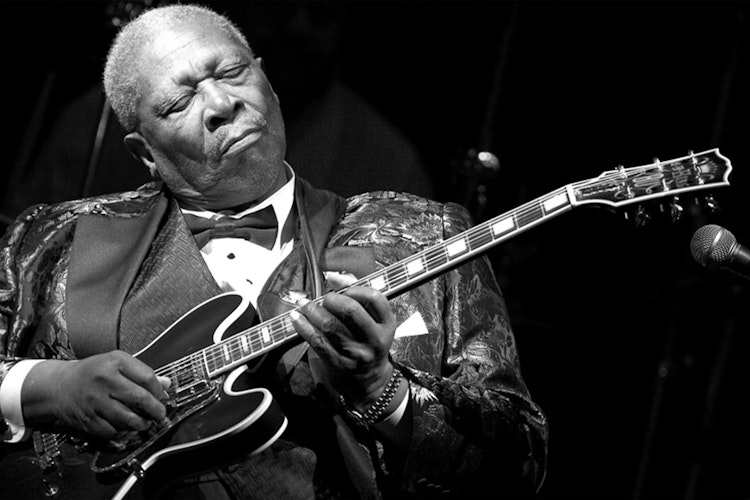In this article, we will celebrate some of Rock music's earliest artists and influencers. Many of these artists were inspired by musicians that came from other genres, such as Blues, Folk, Jazz, and Gospel. You will find these inspirations in most of the artists listed below. In addition to their biographies, be sure to check out their notable songs and what popular artists or bands they are known to have directly influenced.
Don’t forget to review all of our other artist lists.
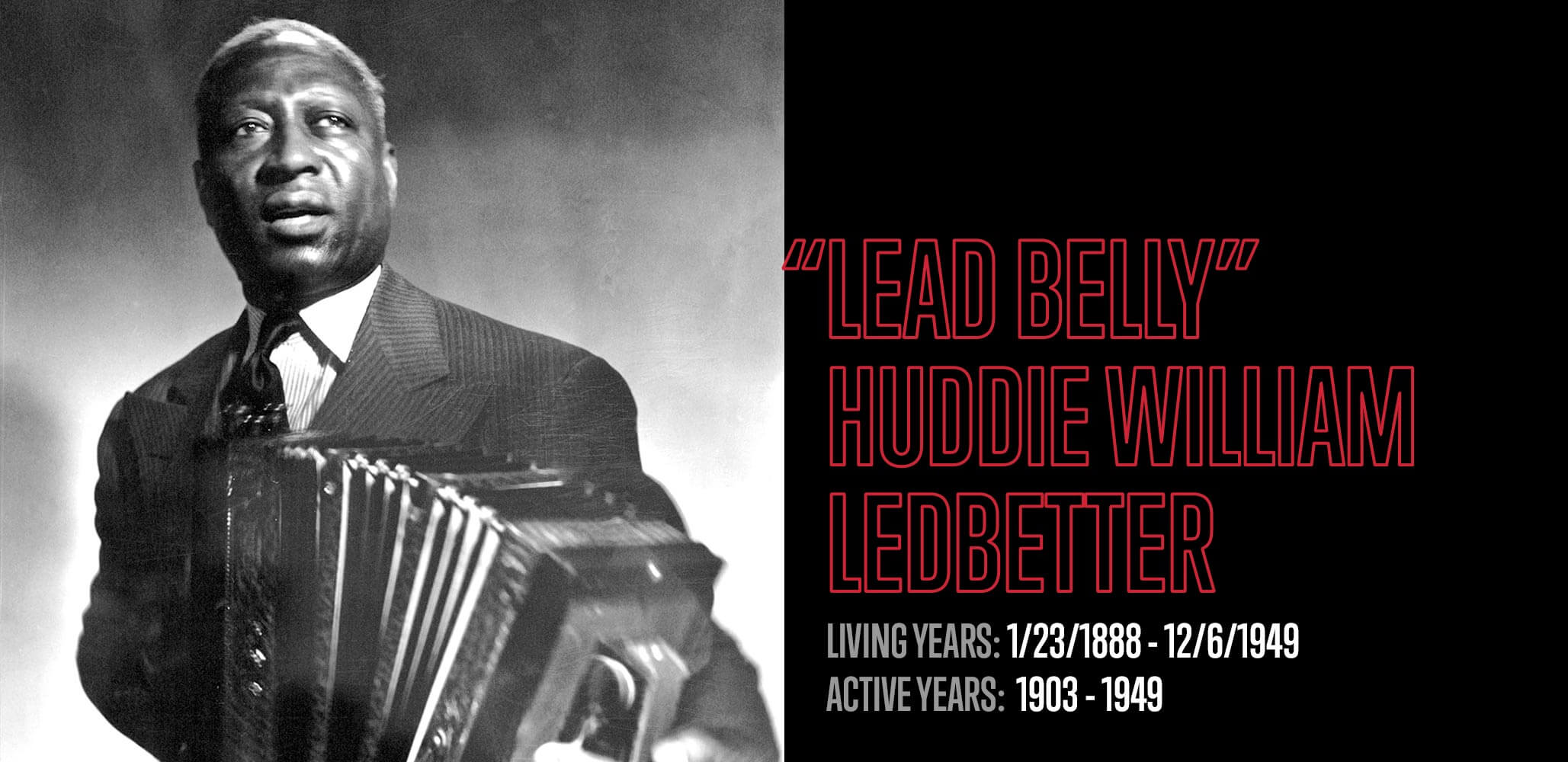
Instruments
Vocals, guitar (especially the 12-string guitar), accordion, mandolin, piano
Genres
Folk, Blues
Notable Songs
Midnight Special, Goodnight Irene, Where Did You Sleep Last Night, Boll Weevil, Cotton Fields, Rock Island Line
Associated Artists/Acts
Josh White, Sonny Terry, Brownie McGhee, Woody Guthrie, The Lead Belly Foundation
Biography
Huddie William Ledbetter, better known as Lead Belly, King of the 12-String Guitar, was born in Mooringsport, Louisiana, and showed his interest in music from the first years of life. However, it was through his uncle Terrell Ledbetter that he had his first contact with the guitar. As Lead Belly’s passion for music began to grow along with his talent he also learned to sing and play the accordion, mandolin, piano and the 12-string guitar (which he called “Stella”).
In 1930, Lead Belly was taken to New York by the folklorists John and Alan Lomax after being found imprisoned in an Angola Farm prison plantation because of a fight. With this move from Louisiana to New York, Lead Belly began to play on college campuses in front of larger audiences. He would eventually begin to work for labels (e.g. Capitol Records) and radio stations (Back Where I Come From / Folk Music of America).
During his musical career, Lead Belly composed more than 500 songs (which can be found in the Library of Congress), won recognition across the country and toured Europe. He passed away in December 1949 due to ALS, also known as Lou Gehrig's disease.
In 1988, Lead Belly was inducted into the Rock and Roll Hall of Fame. His songs, guitar picking style, big voice, and melding of Folk and Blues have influenced countless musicians over the decades, including many of the pioneers of Rock and Roll. His compositions have been covered by such bands and artists as Nirvana, Bob Dylan, Elvis, ABBA, Johnny Cash, Tom Petty, Grateful Dead, The Beach Boys, White Stripes, Red Hot Chili Peppers, Aerosmith, Creedence Clearwater Revival, Led Zeppelin, and many others.
Historical or Cultural Context
Early pioneer of Folk and Blues music, inspiration for countless Rock and Roll artists
Artists/Acts They Influenced
Bob Dylan, The Beatles, The Rolling Stones, Eric Clapton, Little Richard, Nirvana, Creedence Clearwater Revival, Grateful Dead
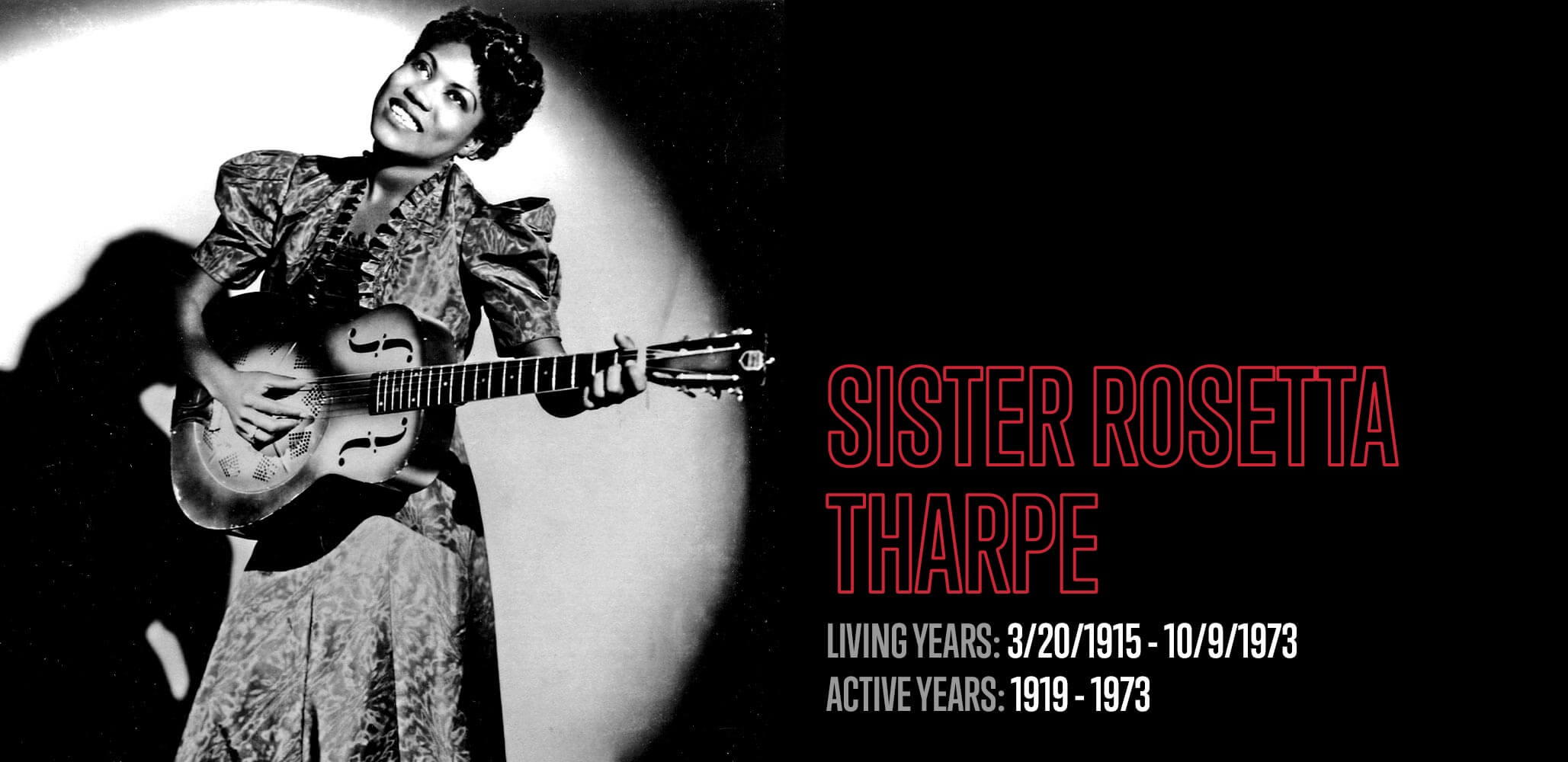
Instruments
Vocals, guitar
Genres
Gospel, Jazz , Blues and R&B
Notable Songs
Strange Things Are Happening Everyday, Rock Me, That’s All, My Man and I, Lonesome Road
Associated Artists/Acts
Cab Calloway, Muddy Waters, Duke Ellington
Biography
Sister Rosetta Tharpe is universally considered to be the Godmother and inventor of Rock and Roll. She was the first gospel artist to successfully make the crossover to wider audiences, popularizing spiritual music and introducing the use of the electric guitar into mainstream music. Memphis Minnie, Bessie Smith and Ma Rainey, along with hymns and spirituals were all influential in shaping Rosetta’s musical style.
The Great Migration of the 1920s brought Rosetta and her mother from rural Arkansas to Chicago. A better life and opportunities were greater for Blacks in bigger cities. Rosetta brought her roots in Gospel music and the soulful, Black sounds of the Blues. She was known for her incredible vocal range, her stunning full-bodied vibrato, and her impressive vocal agility. Her vocal phrasing captured her beefy sound that leaned into her heavy Blues influences.
She was a foundational artist who precedes those we commonly think of today as cornerstone, Rock and Roll pioneers. She influenced artists such as Little Richard, Chuck Berry, Elvis Presley, Johnny Cash, as well as many 1960s British guitarists. Her song “Strange Things Are Happening Everyday” was recorded in 1945. It became the first Gospel record to cross over to the “Race Records” Billboards chart, and is considered by some to be the first Rock and Roll record.
It was revolutionary for Tharpe, a Black woman, to straddle the fence in playing at both churches and nightclubs. However, this caused her to receive a great deal of criticism from disapproving church members. She was not only one of the first artists to perform with an electric guitar but she spiced things up by being the first female artist playing it during its debut in the 1930s. This was an unheard of accomplishment during this time in American society. It can be said that Tharpe’s flamboyant style, rebellious nature, and stage theatrics shaped the rawness of the earliest rock and rollers.
In the 1960s, Tharpe’s celebrity status grew as well overseas in Europe. Muddy Waters was one of the artists she toured with in Europe. In 1964, British television filmed the “Blues and Gospel Train” that included her performance at Wilbraham Road train station in Whalley Range, a performance which is legendary in the influence it had on many of the British rock musicians who saw it. Sister Rosetta Tharpe was inducted into the Rock and Roll Hall of Fame in 2018.
Technical Innovations
Electric guitar pioneer
Artists/Acts They Influenced
Elvis Presley, Chuck Berry, Little Richard, Johnny Cash
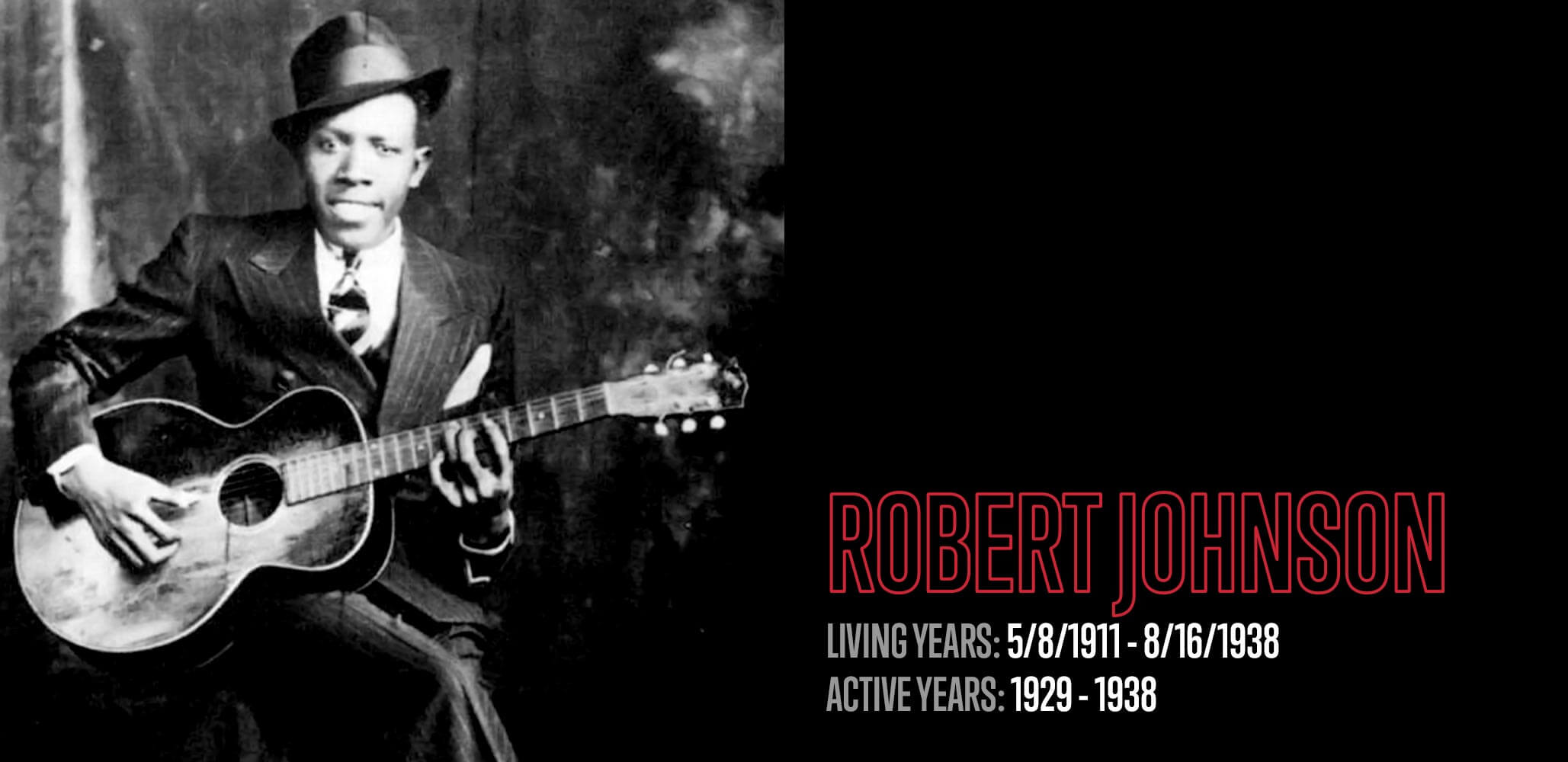
Instruments
Guitar, vocals
Notable Songs
Cross Road Blues, Hell Hound On My Trail
Genres
Delta Blues
Associated Artists/Acts
Son House, Muddy Waters, Honeyboy Edwards
Biography
Robert Leroy Johnson was an American singer, songwriter and guitarist. He was born in Hazlehurst, Mississippi on May 8, 1911. His biological father was forced to dress up like a woman and leave town to avoid lynching before Robert was born.
As there were few performance opportunities in Mississippi for young Black artists, Robert played mostly at Juke Joints and on street corners in front of bars. He was known to be persistent in trying to get opportunities to play with bands that came through town while he was still a developing guitarist. He was not yet good and was chased off the stage quite often.
When Robert moved to Robinsonville in 1919, he found his mentor in Son House. It’s said that Robert went off with Son to learn how to play guitar by sitting in graveyards. He disappeared for about 2 years and when he returned, he’d mastered the guitar. He’d gone from being a notoriously bad guitarist to being able to outplay anyone. Some speculate it was 2 years of intense practice that helped him accomplish this and others said he’d sold his soul to the devil for the ability to play the way he did. Other guitarists of the time said it sounded as if 3 men were playing the guitar when Robert played. This myth is furthered by the lyrics of some of his most famous songs “Cross Road Blues” and “Hell Hound On My Trail.”
Johnson’s career was short as he only participated in 2 recordings during his lifetime. He was inducted into the Rock and Roll Hall of Fame in 1986 as an early influence on Rock and Roll. He was also given a Grammy Hall of Fame Lifetime Achievement Award in 1998. He is widely known as the King of the Delta Blues.
Artists/Acts They Influenced
Rolling Stones, Eric Clapton, Muddy Waters, Red Hot Chili Peppers
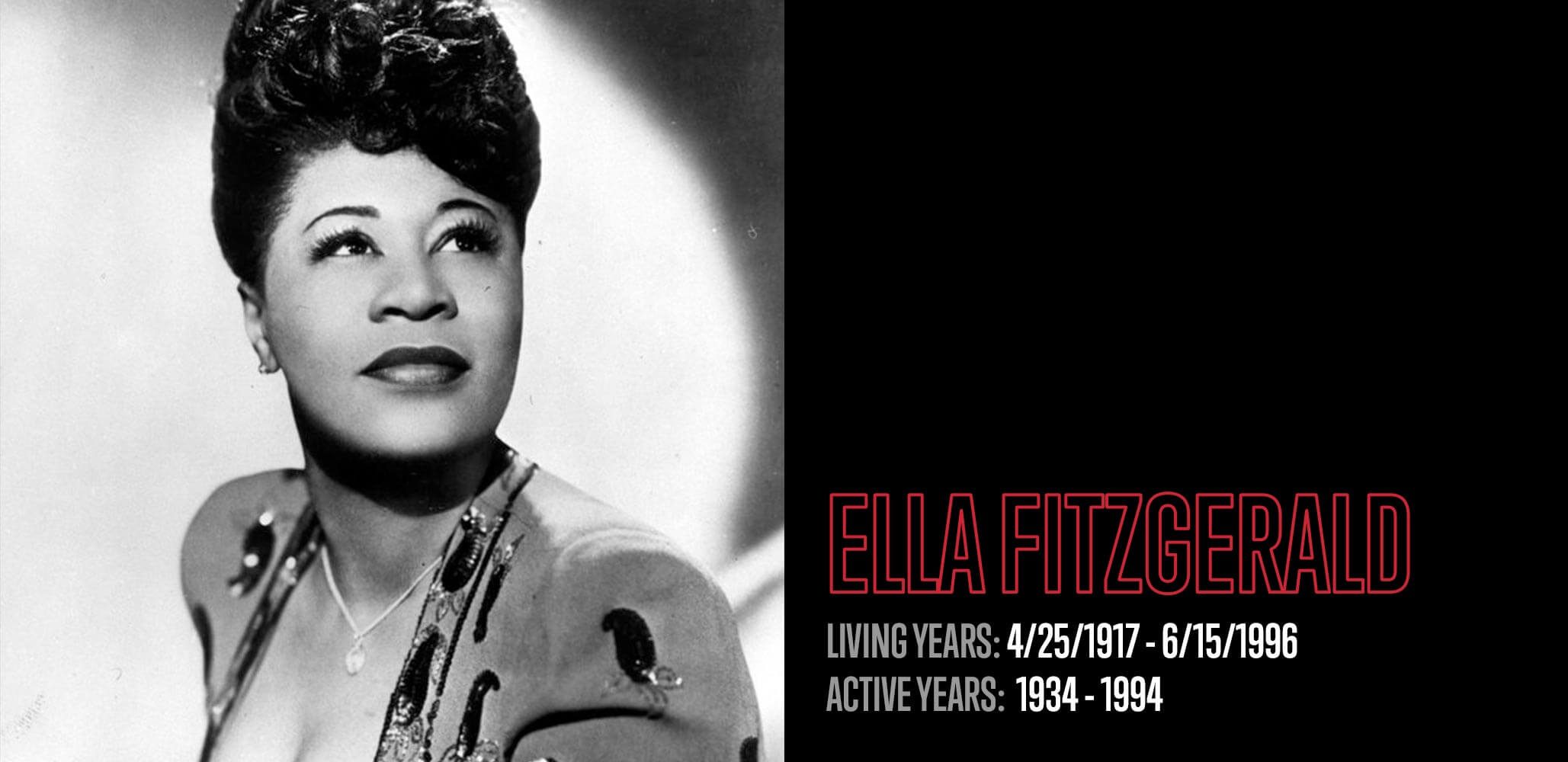
Instruments
Vocals
Genres
Jazz, Bossa Nova, Opera
Notable Songs
A-Tisket A-Tasket, Into Each Life Some Rain Must Fall
Associated Artists/Acts
Benny Goodman, Louis Armstrong, Duke Ellington, The Mills Brothers, Ink Spots, Dizzie Gillespie, Cole Porter, George Gershwin, Irving Berlin, Johnny Mercer
Biography
Ella Fitzgerald was an American Jazz vocalist frequently referred to as the First Lady of Song. Born in Newport News, Virginia, Ella’s life got off to a rough start. Ella’s father left the family when she was 3 years old, and when she was fifteen her mother died from injuries sustained in a car accident, leaving her stepfather to care for her. It was widely believed that he abused Ella. She later went to live with her Aunt in New York but her behavior landed her in a reform school and the “Colored Orphan Asylum” in the Bronx. Ella got her musical start singing in church, but between the ages of 15 and 18, Ella was homeless and made money by singing on the streets of Harlem.
Ella got her break when Chuck Webb, a young band leader in Harlem, decided that his band needed a female vocalist. He asked Charles Linton, the band’s lead singer, to find him one. Charles Webb did not initially want to listen to Ella because she was not the thin white lead vocalist that he had in mind. Linton had to threaten to quit in order to get Charles Webb to listen to her. Charles gave in and agreed to give her a two week trial period. Ella of course got the gig.
Ella was known for her three-octave range, superb diction, effortless swing, and her ability to scat. She was also known to have “one of the best ears in the business,” resulting in the interesting melodic choices she made and her ability to quickly memorize songs.
Ella made a name for herself in the face of discrimination against women and racism. She also started her career during the Great Depression. She was the first African-American woman to win multiple Grammy Awards. Finally, she was one of the first stars to perform during the Super Bowl Halftime Show in 1972.
Ella has won 14 Grammy Awards, including one for lifetime achievement, as well as a Kennedy Center Honor for lifetime achievement (1979) and the National Medal of Arts (1987). She has influenced countless artists from numerous styles and genres - everyone from Odetta to Adele, from Frank Sinatra to Stevie Wonder. In 2007, the United States Postal Service issued a stamp commemorating Ella Fitzgerald’s contributions to American music and culture.
Artists/Acts They Influenced
Lady Gaga, Amy Winehouse, KT Tunstall, Adele
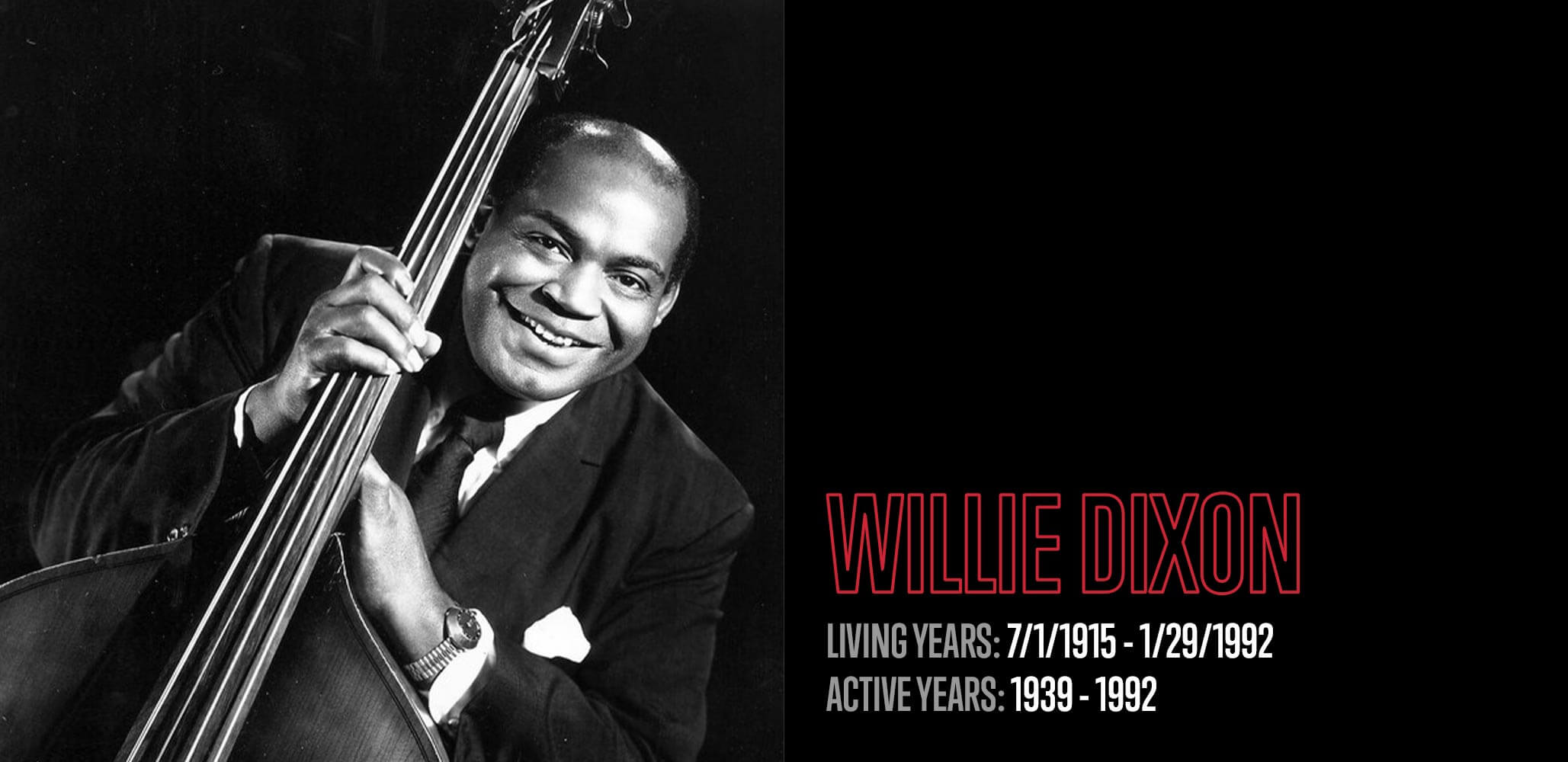
Instruments
Upright bass (double bass), vocals
Notable Songs
I’m Your Hoochie Coochie Man, I’m Ready, Little Red Rooster, Back Door Man, My Babe, Bring It on Home, The Seventh Son, Wang Dang Doodle
Genre
Blues
Associated Artists/Acts
Founder of the Blues Heaven Foundation, Big Three Trio, Muddy Waters, Howlin' Wolf
Biography
William James Dixon was born in Vicksburg, Mississippi. Dixon started singing in a gospel quartet (Union Jubilee Singers) on WQBC radio. Later he dedicated himself to boxing and went professional, but started playing bass three years later and formed the band “The Five Breezes.” Years later, he formed the group “The Four Jumps of Jive” and later the “Big Three Trio.”
Willie worked as a composer and producer on the Chess Records and Cobra labels, and wrote songs for Muddy Waters, Howlin 'Wolf, and Little Walter. He wrote over 500 songs, including many hits that became Blues standards, such as “My Babe,” “Spoonful,” “Little Red Rooster,” “Wang Dang Doodle,” and “Hoochie Coochie Man.” In the late 1960s he formed the Chicago Blues All Stars.
Willie Dixon formed The Chicago Blues Festival in America and The American Folk Blues Festival in Europe, and in 1981 he created The Blues Heaven Foundation, which is still in operation in the historic Chess Records building on Chicago’s south side. The foundation promotes Blues music and the legacy of the Chess Records artists.
Dixon is widely recognized as one of the most influential artists who helped to create the Chicago Blues sound. He also played an important role in connecting Blues to Rock and Roll music through his work with Chuck Berry and Bo Diddley. He is one of the most covered songwriters in recorded music, and his songs have been covered by such legendary Rock bands as Led Zeppelin, The Doors, the Allman Brothers Band, and the Rolling Stones. Dixon joined the Blues Hall of Fame in 1980 and, fourteen years later, was inducted into the Rock and Roll Hall of Fame in the Early Influence category. He died of heart illness in California in January 1992.
Artists/Acts They Influenced
Jimi Hendrix, Muddy Waters, Chuck Berry, Bo Diddley, Led Zeppelin, Allman Brothers Band, The Doors
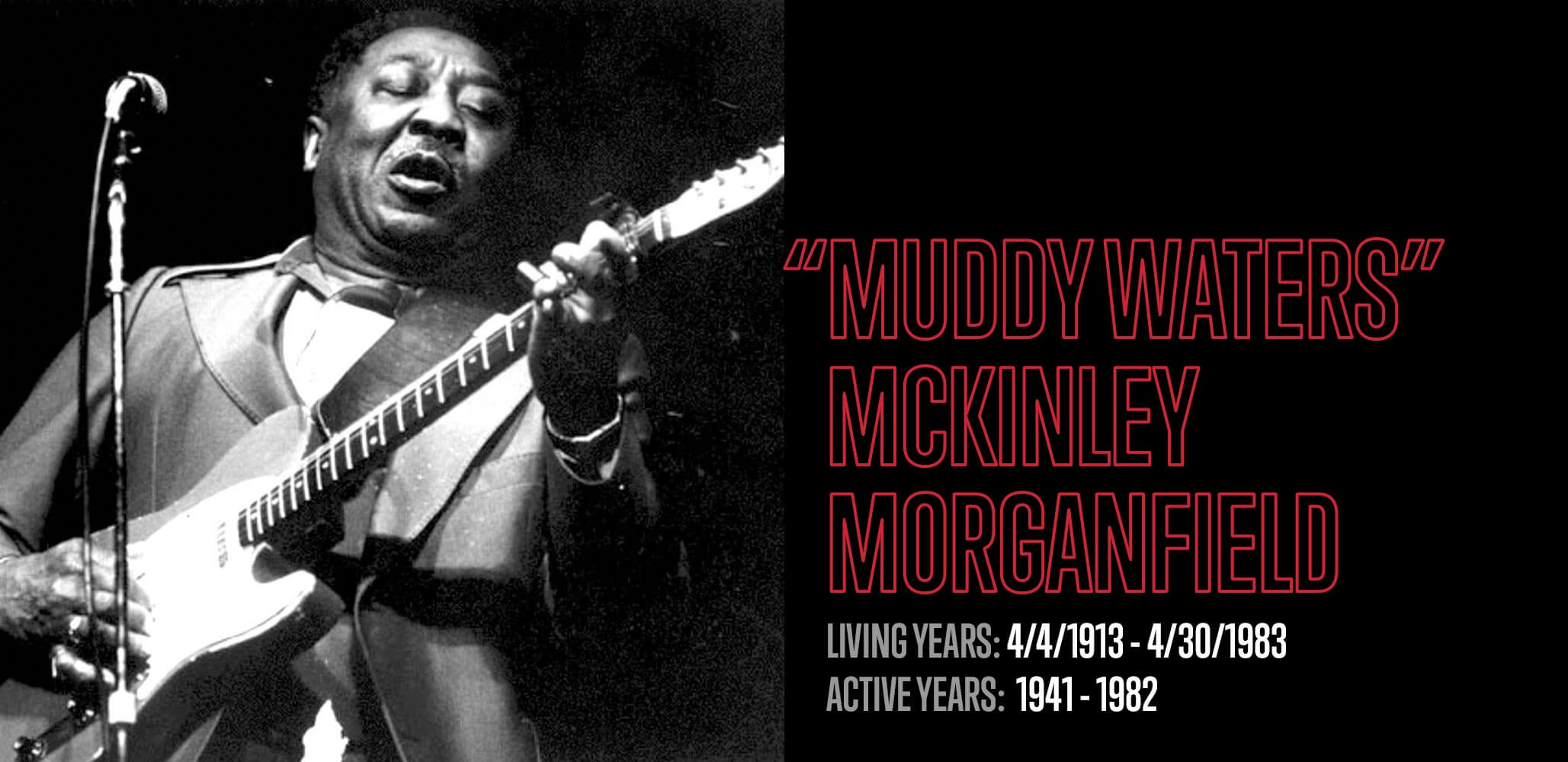
Instruments
Vocals, guitar, harmonica
Genres
Blues, Chicago Blues, Delta Blues
Notable Songs
Mannish Boy, Hoochie Coochie Man, I Just Want to Make Love to You, Rollin’ Stone, Trouble No More, Got My Mojo Working
Associated Artists/Acts
Little Walter, Willie Dixon, Big Bill Broonzy, Jimmy Rogers, Otis Spann, B.B. King
Biography
Muddy Waters was born as McKinley Morganfield in Mississippi in 1913. As a teenager, he began playing guitar steeped in the local tradition of the Delta Blues and influenced by local legends like Robert Johnson and Son House. He chose the stage name Muddy Waters from a nickname given to him by his grandmother.
In the early 1940s, Waters was inspired to pursue music full time when he was recorded by the ethnomusicologist Alan Lomax. He moved to Chicago in 1943, where he was taken under wing by Big Bill Broonzy. Waters quickly gained popularity in Chicago’s burgeoning electric Blues scene and was one of the first acts signed to the new Chess Records. Where Blues music to that point had traditionally been performed on acoustic instruments, Chicago Blues was characterized by the addition of electric instruments and drum kit. Waters’ guitar style adapted the Delta Blues of his youth to the electric guitar and he was renowned for his expressive and aggressive slide playing.
At Chess, Muddy Waters assembled a legendary backing band and produced numerous hits throughout the 1950s that would become Blues standards. Bassist and songwriter Willie Dixon was a frequent collaborator, and many of Waters’ backing musicians from that era became stars in their own right, including Otis Spann, Little Walter, Jimmy Rogers, and Buddy Guy.
Muddy Waters and Howlin’ Wolf became the leading ambassadors for electric Blues through heavy international touring, and influenced countless young musicians in both America and England who would form the next generation of Blues and Rock and Roll players. In the late 1960s and throughout the 1970s, Waters would occasionally collaborate with musicians who grew up idolizing him, such as Johnny Winter, The Band, Paul Butterfield, and The Rolling Stones (who got their name from his signature song “Rollin’ Stone”).
Muddy Waters died in 1983 but his artistry and influence changed the course of modern music. Rock and Roll simply wouldn’t have been the same without him, and Waters was inducted into the Rock and Roll Hall of Fame in 1987.
Artists/Acts They Influenced
Rolling Stones, Led Zeppelin, Jimi Hendrix, The Allman Brothers Band, Cream, Eric Clapton, Johnny Winter, The Band, ZZ Top, AC/DC, Paul Butterfield, Michael Bloomfield, Jack White
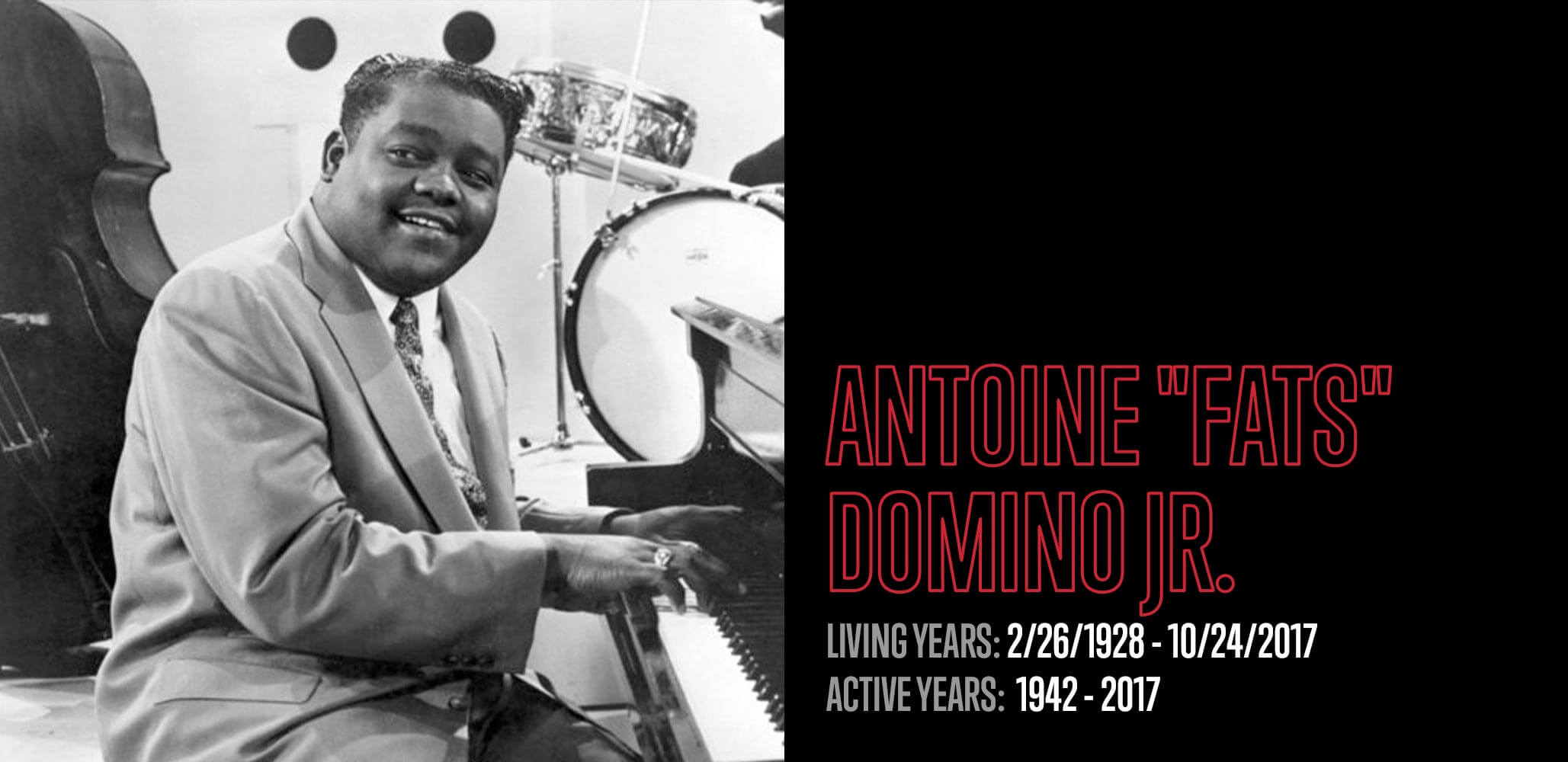
Instruments
Piano, vocals
Genre
Rock and Roll
Notable Songs
The Fat Man, Blueberry Hill, Walkin to New Orleans, Ain’t That a Shame
Associated Artists/Acts
Dave Bartholomew, Cosimo Matassa
Biography
Rock and Roll pioneer Antoine “Fats” Domino was born in New Orleans in 1928. He began to play the piano professionally as a teenager. Fats had the first million selling Rock and Roll record “The Fat Man”, recorded in December of 1949. Over a pounding beat (provided by Earl Palmer on drums), Fats vocally mimicked a trumpet solo before taking a ferocious piano solo. This song is often included in the debate over the origins of the first Rock and Roll record.
Fats continued to dominate the charts until 1962. His string of hits included “Ain’t That a Shame” (covered by Cheap Trick), “Walking to New Orleans,” “I Want to Walk You Home” and “Whole Lot of Lovin’”. While Fats wasn’t charting records anymore, he continued to tour until 1995. He still played occasionally in New Orleans at Jazz Fest.
Ranked #25 on Rolling Stone’s Top 100 Artists, Fats was a huge inspiration for the British Invasion bands and the subsequent bands that have followed. He received the National Medal of Arts and was inducted into the Rock and Roll Hall of Fame’s inaugural class. During Hurricane Katrina, Fats was feared dead but was airlifted to safety. He was the subject of 2015’s The Big Beat: Fats Domino and the Birth of Rock and Roll. Fats passed away October 24, 2017.
Artists/Acts They Influenced
The Beatles, Cheap Trick, Elton John
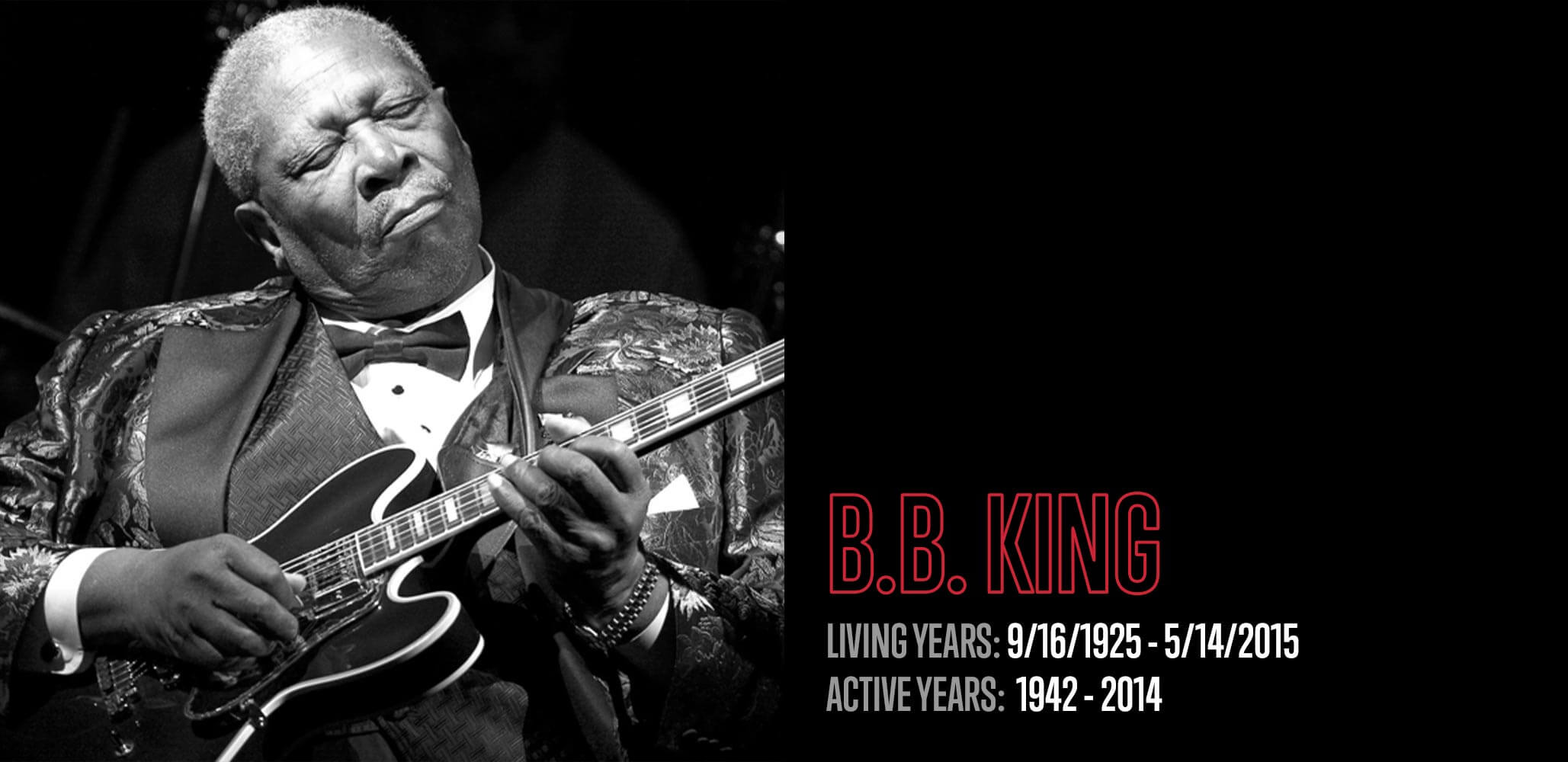
Instruments
Guitar, vocals
Genres
Blues, R&B, Blues Rock
Notable Songs
Three O’Clock Blues, Darling, You Know I Love You, Woke Up This Morning, Please Love Me, You Upset Me Baby, Chains and Things, Paying the Cost To Be the Boss, I Like To Live the Love, The Thrill Is Gone
Associated Artists/Acts
Eric Clapton, U2, B.B. King Orchestra, Bobby Forte, Bobby "Blue" Forte
Biography
Riley B. King, known as B.B. King, was born near Itta Bena, Mississippi in 1925. At age 12, he was taught his first three chords on the guitar by the minister of his local church where he sang in the choir.
B.B. King learned about the Blues with his cousin, Bukka White, when he moved to Memphis, Tennessee in 1947. King started to gain popularity when he appeared on Sonny Boy Williamson's radio show. From there, he began to play more actively around Memphis, primarily in clubs on the famous Beale Street. So much so, that he earned the nickname “Beale Street Blues Boy,” which was later shortened to just “Blues Boy,” then eventually “B.B.”
King went on to call his guitar “Lucille” as a reminder of the day he recovered his guitar from a concert hall that caught fire due to a kerosene barrel that was dropped in the middle of a two-man fight over a woman named Lucille.
B.B. King and his band were known for gigging extensively. In 1956 alone, they had 342 performances! Contrary to many others guitarists, B.B. King was known for his simple style of playing and improvising. Instead of playing many notes, he preferred playing fewer notes but with more feeling and accuracy.
By the late '60s, as King’s music began to become recognized by white musicians like Eric Clapton, B.B. was given opportunities to play in different venues that were typically reserved for white performers in front of white audiences. In 1970, B.B. finally won his first Grammy for his rendition of the song “The Thrill Is Gone.”
In 2006, King received the Medal of Freedom from U.S. President George W. Bush. And two years later, in 2008, President Barack Obama sang an excerpt from the song “Sweet Home Chicago” during a performance by B.B. King with other artists at the White House.
B.B. King released more than 50 albums in his career and is a member of both the Blues and Rock and Roll Halls of Fame. He was also awarded honorary doctorates from Tougaloo College, Yale, Berklee College of Music, and Brown.
King passed away in his sleep in 2015 at the age of 89.
Artists/Acts They Influenced
Jimmi Hendrix, U2, The Rolling Stones, Billy Gibbons (ZZ Top), Eric Clapton, Carlos Santana, Fleetwood Mac, Stevie Ray Vaughan and many others
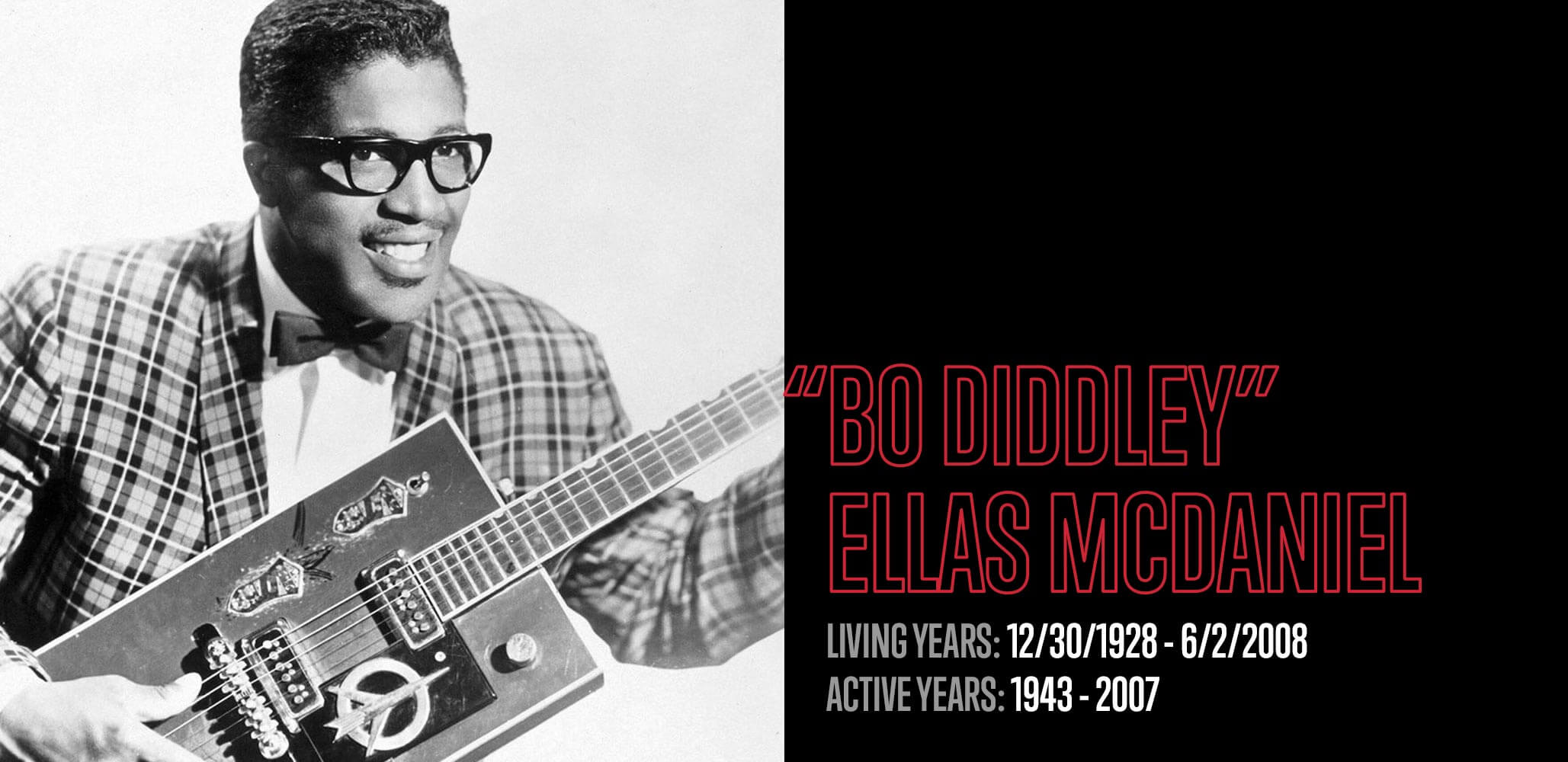
Instruments
Vocals, guitar
Genres
Blues, R&B
Notable Songs
Bo Diddley, Roadrunner, Who Do You Love, Pretty Thing, Can’t Judge a Book
Biography
Ellas McDaniel, better known to the world as Bo Diddley, created not only a unique sound, but his own signature beat. Born in Mississippi, Bo was raised in Chicago by his mother’s cousin who adopted him. Bridging the gap between Blues and creation of Rock and Roll, Bo Diddley is known as “the Originator”.
Bo began playing professionally in the mid '40s and worked his way up from West Side street corners to the South Side clubs. In 1955, he recorded his first hit “Bo Diddley” for Checker Records (subsidiary of Chess Records). Bo followed that up with two more hits, “Pretty Thing”, and “Mona.” In the '60s Bo continued to tour and release additional hits such as “Can’t Judge a Book” and “Roadrunner”. Bo was incredibly popular in England where he was a major influence on the British Invasion bands, especially the Rolling Stones and the Pretty Things, who took their name from Bo’s hit single.
The Bo Diddley beat is one of the most recognizable rhythms in Rock and Roll. Influenced by African percussion patterns, it’s essentially a variation of the 5 note clave beat. While it existed in Rhythm and Blues music previously as a type of Rhumba beat, the Bo Diddley beat was featured on many of Bo’s tunes. It also has roots in an African American tradition known as “hambone” which combines dancing or stomping with rhythmic drumming on the body. This West African tradition was carried on by slaves when they were not allowed to play or possess instruments.
In many ways Bo Diddley represents an archetypal, larger than life mythical figure. His self proclamations and boasts are proto-Rap. In “Who Do You Love”, Bo stakes his claim as a powerful and dangerous young man: "Tombstone hand and a graveyard mind, just 22 and I don't mind dying."
The song “Say Man” featured Bo and Jerome Green trading insults with each other in the African American tradition of “the dozens,” a game where the participants try to outdo each other with elaborate putdowns. Bo was also known for his non-traditional guitars, including his square custom Gretsch.
Bo Diddley also had a unique sound due to the instrumentation of his bands. They featured Bo’s tremolo-drenched guitar and Jerome Green’s insistent maracas. Many of Bo’s biggest songs only employed one chord, placing the emphasis on the beat and rhythm. Bo is also credited with having women in his band, including female lead guitarist Lady Bo (Peggy Jones).
Bo was inducted into the second class of the Rock and Roll Hall of Fame in 1987. In 1989 Bo, along with athlete Bo Jackson, starred in Nike's “Bo Knows” ad campaign. Bo continued to perform until he suffered a stroke in 2007, and he passed away in 2009. Bo Diddley was a true American original whose influence can be heard in hundreds of songs, from Buddy Holly’s “Not Fade Away” to U2’s “Desire”.
Technical Innovations
The Bo Diddley Beat
Artists/Acts They Influenced
Pretty Things, Rolling Stones, Buddy Holly, U2, George Michael
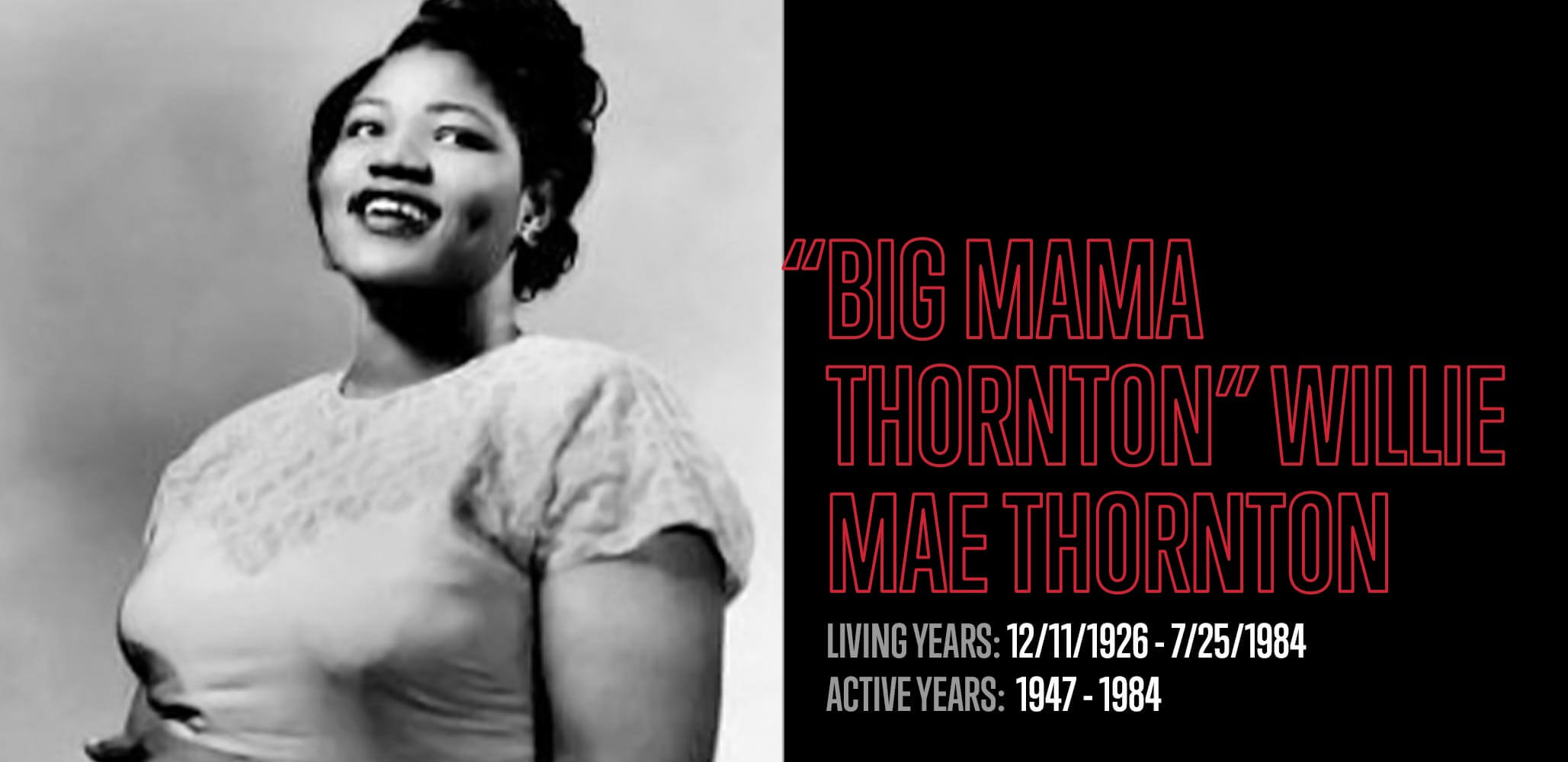
Instruments
Vocals, harmonica
Genres
Blues, R&B, Soul
Notable Songs
Associated Artists/Acts
Johnny Otis, Muddy Waters, Lightnin' Hopkins, John Lee Hooker, Buddy Guy, Mississippi Fred McDowell
Biography
Big Mama Thornton was a vocalist and Blues songwriter who has been largely under appreciated for her important role in the birth and development of Rock and Roll music. She was born in Alabama as Willie Mae Thornton and grew up singing in her father’s church. Thornton was nicknamed “Big Mama” at the beginning of her career by a manager of The Apollo Theater who was impressed by her immensely powerful voice and her larger-than-life personality.
Thornton’s career took off in 1952 when she recorded the song “Hound Dog”, which was written specifically for her. While Elvis Presley’s later version of this song is more widely known, Big Mama Thornton’s version is hailed as a seminal Rock and Roll performance due to her unbridled and soulful vocals which draw as much from her early Gospel influences as from the Blues.
Thornton later worked with Blues legends such as Buddy Guy, Muddy Waters, and John Lee Hooker, though she never duplicated the popular success of “Hound Dog.” Her career enjoyed a resurgence in the late 1960s when Janis Joplin, a huge admirer, covered Thornton’s original Blues song “Ball and Chain” and offered her an opening slot on tour.
Big Mama Thornton’s career stalled in the late 1970s and early 1980s, as her talents and contributions were overlooked by white audiences and she suffered through health complications brought on by alcohol abuse. She died in 1984. In recent years, more and more music fans have become aware of her work and her legacy as a Blues singer and one of the early pioneers of Rock and Roll music. Aside from her incredible voice, as powerful as anyone’s in popular music history, Thornton was greatly admired by her contemporaries for her unyielding non-conformity and her celebration of body-positivity.
Artists/Acts They Influenced
Elvis Presley, Janis Joplin, Etta James, Koko Taylor
This article was last updated in September, 2020.



